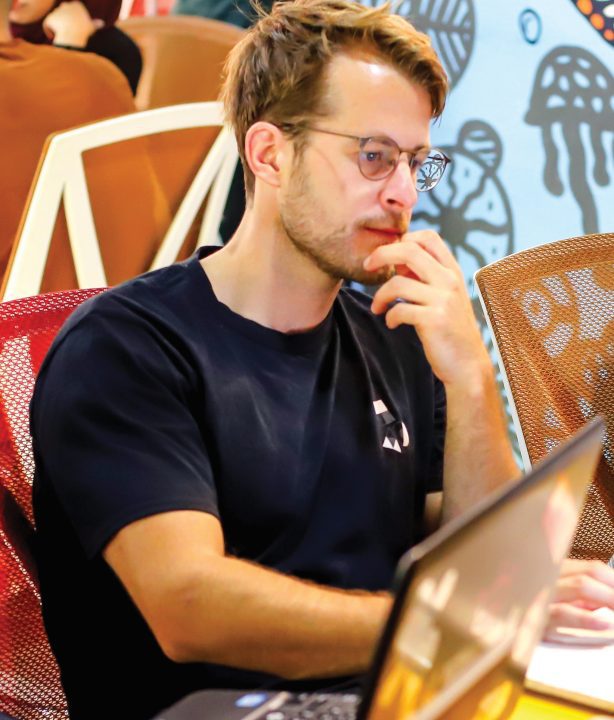When 25-year-old graphic design graduate Fabio Cawley joined Chapel Street Studio, a co-op of freelance creatives based in Bradford, it boosted his confidence and skills – and opened the door to new career opportunities.
“Thanks to being part of this co-op, I now see myself as a graphic designer, instead of just a graduate,” he said. “I’ve had some challenging pieces of work and I can see the progression. That makes me happy. A lot of people say they like my work. You can’t get better than that.”
The lack of decent work is one of several challenges affecting young people in the UK – along with climate change, the economy, Brexit, social media and the aftermath of the Covid pandemic. A lot of these issues have co-op solutions, and a new report from UK sector body Co-operatives UK – featuring stories like Fabio’s – is making the case for co-operation to a wider audience.
“With so much in disarray, is it possible to reach young people and help them feel more secure and actively improve their lives?” it asks.
The answer is a resounding yes, based on the YouGov research, evidence and case studies which form the basis of the report. The research was commissioned by Co-operatives UK last year to examine the challenges faced by 16 to 25-year-olds to better understand how co-operative organisations can support them now.
The challenges identified by the research can broadly be grouped into four categories: mental health; decent work; social inequality and an increasing digital divide; and social and environmental problems.
Mental health was the largest issue: in the survey, 76% of young women and 60% of young men have faced mental health issues, or know someone who has. Younger generations also feel socially isolated due to information overload and social media – a problem which has only been exacerbated by Covid.
“Young people need to feel a sense of purpose, belonging and security,” says the report. “Mental health challenges are not an impossible situation to improve. The ownership and control co-ops offer people can and should make a difference.”
Isaac Finn, 22, a third-year economics student at Loughborough, experience depression in his first two years. “There was stuff going on in my life but it was also about the world – Covid, the climate crisis, everything,” he said. “I got help from my personal tutor and got counselling. Then I decided I wanted to help other people.”

He came up with the idea of Kocoon – now a fledgling platform co-op created to help young people understand, manage and improve their wellbeing, through access to academic research and signposting to services.
The report also highlights how a decent working environment can help mental wellbeing. Steph Rutherford, 29, found purpose and peace of mind volunteering at Village Greens co-op during the pandemic.
“I’ve had struggles with my mental health, so as much as it was to help out the store, it was also knowing that I would struggle to live by myself,” she said. “There’s always a positive energy in here. It still helps now … I’ve had a long struggle with my mental health. And every day I go into work I come out feeling better, which I know is incredibly rare; knowing you’ve got a support network around you.”
One key to engaging young people is through their shared values, says the report. This is particularly the case with equality. Awareness of discrimination has increased in recent years as issues such as unequal pay and unacceptable behaviour in the workplace have been thrust into the spotlight alongside the Black Lives Matter, Me Too and transgender rights campaigns.
Related: Report from the National Youth Summit
“For 16 to 25-year-olds, these are more than just slogans; they’re personal challenges,” says the report. The research found that 40% of 16 to 25-year-olds have faced discrimination in and outside of work, while two thirds of young people would like to work for a more ethical employer. The research also found that groups more likely to face discrimination put greater value on ethical issues. For example, when considering careers, a diverse workforce is more important to young women (51%) than men (33%).
“Co-operatives are built on a shared set of values and principles – and young people are increasingly looking for good employers who treat people fairly,” the report adds.
One example is web design agency Yalla Cooperative: with a team based in the UK, Palestine, Turkey and Germany, international, anti-prejudicial understanding is crucial. Founder member Joe Friel said: “Countless times I’ve spoken to friends who say they’re in a toxic work culture … but that isn’t the way co-ops work. You are given a voice and allowed to bring fresh ideas – and the business benefits.”

Many young people see tackling climate change as being essential to building a fairer world – and half of them want more ethical employment that takes account of such issues.
But more awareness of co-ops is needed if they are to fulfil their potential to meet these challenges. “Co-operatives are slowly gaining traction with younger people,” says the report. “Our case studies reveal how co-operatives directly combat the issues affecting younger people. A deeper understanding of those issues and solutions can help co-operatives do more to transform the lives of an entire generation.”
The report offers a series of recommendations: raising awareness of co-ops through curricula and careers guidance, ensuring that entrepreneurial support for young people includes co-op options, and making government employment schemes more accessible to co-ops.
It says co-ops should work harder to understand the needs and values of younger consumers and look for areas of alignment with their own value offer, while those taking action on issues like the climate emergency and social justice should prioritise youth participation. Digital engagement, communication and employment opportunities (through apprenticeships, paid internships etc) should also be looked at.
“Young people are the future of the movement and the values of Generation Z chime with the co-operative values,” the report says. “The movement offers hope and solutions to transform and enable a fairer future for everyone.”
Rose Marley, CEO of Co-operatives UK, said: “This is one of the most challenging times to be a young person in the UK. But there’s hope. Ownership and control aids mental health and wellbeing significantly.
“Co-operatives allow young people to thrive in an environment that provides fair wages and secure jobs, tackles climate change and provides both educational and personal development alongside a sense of belonging.”

